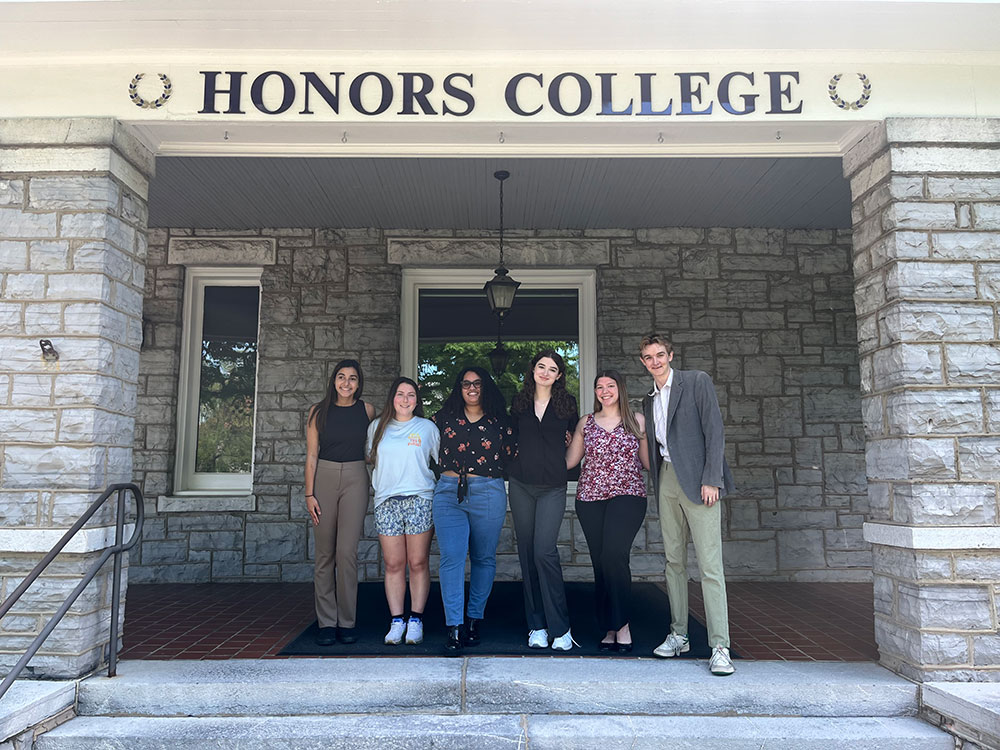Honors College Summer Enrichment Experience Scholarships provide funds to support transformative, off-campus summer experiences for outstanding Honors students via the Hillcrest Scholarship, Hinshaw-Warren Scholarship, Frederick I. McGhee Scholarship for Aspiring Entrepreneurs, and the Witherspoon Scholarship.
Students submit one application and are considered for all Summer Enrichment Scholarship opportunities for which they are eligible. Recipients receive up to $5,000 in financial assistance to engage in research, internships, entrepreneurial activity, creative endeavors, language training, or service- or leadership-related initiatives. Students are encouraged but not required to work with a faculty mentor to design unique projects that help them meet their academic and/or career goals.
Applications are due by November 15 in the fall, preceding the proposed summer project. Successful applications are selected based on the quality of the proposed project, the ability to connect the proposed experience to future goals, leadership experience and community engagement, ability to make a significant contribution to society in the future, and the transformative potential of the proposed project. Students can review detailed application instructions in Canvas. Contact Dr. Felix Wang if you have questions about the application process.
Available Scholarships
The Hillcrest Scholarship was established by the Honors Advisory Council to support summer enrichment experiences for outstanding sophomore students. Students may use the scholarship to carry out research, to participate in an internship, to engage in a service-learning project, or to fund language training or another training program related to the applicant’s academic goals. (The scholarship is not limited to these examples.) Students, with the aid of their faculty mentors, are encouraged to design unique projects that help them meet their academic and/or career goals. Please note that the scholarship cannot be used to fund a JMU Study Abroad program.
The Hinshaw-Warren Scholarship is awarded using the same criteria as the Hillcrest Scholarship, but recipients must have demonstrated financial aid as defined by the Office of Financial Aid and Scholarships.
The Fredric I. McGhee Scholarship for Aspiring Entrepreneurs provides financial assistance to carry out transformational off-campus experiences such as (but not limited to) a business startup, analysis of a new product or conceptual idea, an internship, or a project related to the Honors capstone project.
The Witherspoon Scholarship is an endowed scholarship made possible by the generous donation of Margaret E. and Douglas F. Witherspoon whose daughters, Laura ('12) and Catherine ('17) were members of the JMU Honors College. Each summer, one scholarship will be available for a first- or second-year student who seeks to complete an immersive summer research experience with a mentor, on- or off-campus. Recipients of the Witherspoon Scholarship must be enrolled in at least 1 summer credit.
2024 Recipients

2024 scholarship recipients are listed in order from left to right.
Naomi Minwalla ('26), Witherspoon Scholarship
Naomi's thesis focuses on the distinct ways power can be expressed and interpreted in both Washington, D.C. and Seville, Spain. She recently traveled to Seville to pursue research and assist in running the Warfare, Environment, Social Inequality, and Pro-Sociability Biennial Conference (WESIPS). As a Political Science major, she focuses her research on symbols and various interpretations of power cross-culturally.
Corrinne Cullina ('25), Fredric I. McGhee Scholarship for Aspiring Entrepreneurs
Corrine, a Biology major, took a class through JMU X-Labs called Medical Innovations, in which her team of seven invented a class 1 medical device that aims to help EMTs and other healthcare professionals pick up fallen patients without injuring themselves. Corrinne and her team plan to maintain forward momentum on this product over the next few years as they work toward commercialization.
Regan Elmore ('25), Hinshaw-Warren Scholarship
Regan, an Independent Scholars major, recently participated in The Art & Culture of Japan study abroad program. While in Japan, she used her free time to visit museums and conduct research, which she will share through photos, videos and a traditional thesis. Her project focuses on exploring the influence of astrology on East Asia, from folklore to the spread of the cultural system.
Katherine Jendzurski ('26), Hillcrest Scholarship
One of Katherine's biggest goals is becoming fluent in Mandarin in speaking, reading and writing. As a Communication Sciences and Disorders major on the Audiology track, she aims to make connections and build trust with her future patients and their families who may not be English speakers. Katherine plans to participate in the Asian Business Analytics Summer Study Abroad Program to have an immersive experience and continue learning Mandarin.
Abigail Kern ('26), Hillcrest Scholarship
Abigail, an English major, recently traveled to the University of Cambridge and participated in several English- and literature-based classes adjacent to many historic literary sites. She plans to use the writing pieces and lesson plans she created there in her portfolio project, which she will eventually submit in her application to JMU's Education Master's program.
Joshua Gunn ('25), Hillcrest Scholarship
Joshua, a Chemistry major, is currently researching behavior and mimicry in garter snakes. He traveled to Inwood, Manitoba, Canada to his field site and performed experiments to link sex behavior with pheromone quality. His Honors capstone will be written and eventually transformed into a manuscript for submission to a peer-reviewed journal.
View 2021-22 and 2020-21 recipients for information about past projects and experiences.
